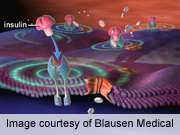Even a short period of moderate or severe undernutrition or famine during childhood or adolescence can increase the risk of developing type 2 diabetes in adulthood, according to research published online May 29 in Diabetes.
(HealthDay) -- Even a short period of moderate or severe undernutrition or famine during childhood or adolescence can increase the risk of developing type 2 diabetes in adulthood, according to research published online May 29 in Diabetes.
Annet F.M. van Abeelen, Ph.D., of the University Medical Center Utrecht in the Netherlands, and colleagues conducted a study involving 7,837 women from the European Prospective Investigation Into Cancer and Nutrition study who had been exposed to the 1944 to 1945 Dutch famine between the ages of 0 to 21 years. The association between undernutrition during childhood and adolescence with type 2 diabetes in adulthood was explored.
After adjusting for potential confounders, including age at famine exposure, smoking, and education level, the researchers found that there was a dose-response association between self-reported famine exposure and the risk of type 2 diabetes. Relative to unexposed women, those who were exposed to moderate famine had an age-adjusted hazard ratio of 1.36 for type 2 diabetes, and those exposed to severe famine had an age-adjusted hazard ratio of 1.64. The associations persisted after adjustment for confounding variables.
"This study demonstrates for the first time, by using individual famine exposure data, that a short period of severe undernutrition during childhood or young adolescence is associated with an increased risk of type 2 diabetes in adult life, in a dose-dependent manner," the authors write.
More information:
Abstract
Full Text (subscription or payment may be required)
Journal information: Diabetes
Copyright © 2012 HealthDay. All rights reserved.



















